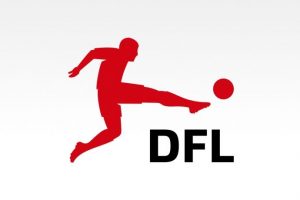 What is the Sports Medicine / Special Match Operations Task Force’s take on the recently completed 2020-21 season? Prof. Dr. Tim Meyer (Head of the task force) and Ansgar Schwenken (Member of the DFL Management Board, Director of Football Affairs & Supporters) give us their thoughts:
What is the Sports Medicine / Special Match Operations Task Force’s take on the recently completed 2020-21 season? Prof. Dr. Tim Meyer (Head of the task force) and Ansgar Schwenken (Member of the DFL Management Board, Director of Football Affairs & Supporters) give us their thoughts:
Professor Meyer, Mr Schwenken, we still have the relegation play-offs to come – then the German professional football season will be over. Will this also mark the end of the work of the Sports Medicine / Special Match Operations Task Force?
Ansgar Schwenken: The task force will remain in place in some form or other over the summer break and certainly also during the forthcoming season. It’s very good news that we seem to have broken the third wave of infections in Germany – first and foremost for the whole of society and thus also for the sporting community. But we should expect the pandemic to stay with us for quite some time yet. During the next few weeks, we will start looking intensively at next season and making preparations, and we will decide as we go along the exact form the task force’s work will take going forward.
Prof. Dr. Tim Meyer: Personally, I think that we will be able to cut down the number of protective measures for matches significantly next season. I’m hoping there will be a high vaccination rate among professional footballers, far higher than the vaccination rate of the general population. On the task force, we are already preparing intensively for next season.
What was your experience of the final leg of the season?
Meyer: It was a very intensive leg. In addition to our regular virtual meetings, since February there have also been daily – and on some days even hourly – communications on the task force. We have also been in constant contact with most of the clubs. The top priority is – and will remain – of course the health of everyone involved. We had a strong belief that the recent positive direction of the pandemic in Germany combined with the quarantine measures mandated by the DFL would result in the season being played to its end on the pitch. And happily this is what has transpired. We just have the last play-off matches left to play.
Schwenken: It’s common knowledge that several teams had to quarantine in March and April, and some fixtures had to be rescheduled. This presented a number of challenges in terms of match scheduling for both the DFL and the clubs, as the relegation play-off matches and the release period for the European Championship meant there was no flexibility beyond the end of the season this year. This is also one of the reasons why the Executive Committee of the DFL decided to order a “quasi quarantine” and to organise a “quarantine training camp” to provide extra safeguards for the staging of matches on the last few matchdays. But we still considered a wide range of scenarios regardless to ensure that we could end the season on the pitch and according to the envisaged schedule. We just have three relegation play-off matches left to go – and we will have finally achieved this aim. It was an unbelievable effort. And it was a team effort from all the clubs; their players, training and coaching staff, and employees; the task force; numerous employees at the DFL and lots of other stakeholders. The half-life of forecasts has gone down significantly over the course of the pandemic, but we hope that we will be able to remove all terms such as “quarantine training camp” from our vocabulary sooner rather than later.
How are the plans shaping up for the forthcoming season?
Schwenken: It’s not exactly clear yet in terms of occupational health and safety, which is managed under the medical and hygiene-related concept. The Employers’ Liability Insurance Association (‘Verwaltungsberufsgenossenschaft’, VBG) makes the decisions about this, and we are in contact with them. The plans hinge on a whole range of aspects – foremost of which, of course, are the development of the pandemic in Germany and our progress on the vaccination front. As Professor Meyer has already said, we hope that we will be able to significantly scale back the number of protective measures next season.
You’ve raised this issue already: What is the current status regarding vaccinations?
Meyer: We’ve been discussing the issue of vaccinations for some weeks now and are continuing to do so on an informal basis with the team doctors of the clubs in the Bundesliga and Bundesliga 2, so we know that, vaccination priority lists permitting, the first round of vaccinations are scheduled to take place over the coming days and weeks.
Schwenken: There cannot and will not be a centralised, league-wide vaccination campaign – simply due to the different rules in the federal states. Priority lists for certain vaccines have already been scrapped in some states, but not yet in others. And it is ultimately up to individuals to decide whether they want to be vaccinated or not. In addition, there are various tournaments due to take place this summer with the final round of the European Under-21 Championship, the UEFA EURO and the Olympic Games – we need to factor this into our decisions on when to vaccinate the relevant players. Naturally, we hope to see a high vaccination take-up among players in the Bundesliga and Bundesliga 2. But the actual process is the individual responsibility of the clubs within the framework of the applicable vaccine priority lists.
Meyer: Clearly, the same goes for large sections of society as it does for professional athletes that being vaccinated can provide significant additional protection against infection and serious illness with COVID-19.
How do you rate the 2020-21 season in the Bundesliga and Bundesliga 2 from a medical perspective?
Meyer: We kept a close eye on match operations from a scientific perspective too. For this we rely on information from the team doctors of the clubs, and I think they took an exceptionally careful and responsible approach during what was an incredibly challenging time for them as well. According to the information we have, almost all of the 217 infections that the clubs reported to us over the 2020-21 season were asymptomatic cases or cases involving mild symptoms – this figure was taken from the group of persons included in the regular PCR testing programme, comprising the professional team, coaching team and team officials, for clubs in the Bundesliga and Bundesliga 2. There were two cases of players being admitted to hospital, but fortunately they were both discharged within a few days.
What do you think about the number of infections?
Meyer: We expected there to be more positive cases than after the restart for the nine matchdays of the previous season because of the course the pandemic took during the second and third wave of infections in Germany. These cases were also due to contacts in a private setting as the players weren’t isolating for the whole of the season – nor would we expect them to. Their family members, for example, may also have had unavoidable contact with other people – be it at work, at school or at nursery. We’re pleased to say that the two-stage quarantine measures at the end of the season clearly had an effect as an additional protective measure. It is also important to note that, unlike in wider society, there are virtually no unreported cases of infection in professional football due to the stringent compulsory PCR testing and the recently introduced daily antigen tests. If we compare the 217 positive cases with the rough number of 1,700 regularly tested individuals, the incidence is in the ballpark of the general population, if we take into account the unreported cases identified by studies. A figure of 217 positive cases in a total of roughly 130,000 completed PCR laboratory tests gives us a positive case rate of less than 0.2 per cent.
What is your assessment regarding the return of spectators?
Meyer: I think the admission of spectators is a realistic prospect. Stadiums certainly won’t all be full to capacity again, but hopefully it will no longer be necessary to hold matches without any fans at all in the stadiums – that is, assuming that the current rates of infection hold steady.
Schwenken: Clubs in the Bundesliga and Bundesliga 2 already took action last summer to develop comprehensive concepts for their individual locations to allow for a gradual return of spectators. The situation should be made easier by a high number of vaccinated prospective stadium-goers in the population. But another key factor for the forthcoming season will be the laws and ordinances on mass events, and it is not possible to predict with any certainty what they will be right now. I hope that spectators and guests will soon be admitted to venues again – not just for all sporting activities in Germany, but also for the sake of cinemas, concerts, theatres and other cultural events. The DFL will, of course, continue to do everything in its power to support clubs in this regard. Even the small number of spectators that were allowed into some stadiums in the autumn and on Matchday 34 illustrated again how much we have missed having fans in the stands.
 Arunava about Football A look at football & the world through my eyes!
Arunava about Football A look at football & the world through my eyes!



